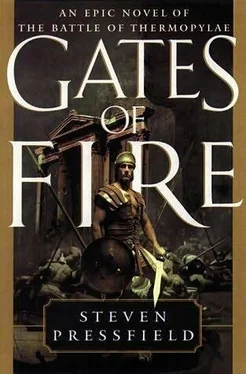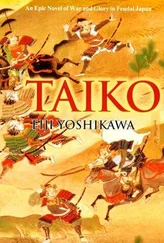Steven Pressfield - Gates of Fire - An Epic Novel of the Battle of Thermopylae
Здесь есть возможность читать онлайн «Steven Pressfield - Gates of Fire - An Epic Novel of the Battle of Thermopylae» весь текст электронной книги совершенно бесплатно (целиком полную версию без сокращений). В некоторых случаях можно слушать аудио, скачать через торрент в формате fb2 и присутствует краткое содержание. Жанр: Историческая проза, на английском языке. Описание произведения, (предисловие) а так же отзывы посетителей доступны на портале библиотеки ЛибКат.
- Название:Gates of Fire: An Epic Novel of the Battle of Thermopylae
- Автор:
- Жанр:
- Год:неизвестен
- ISBN:нет данных
- Рейтинг книги:3 / 5. Голосов: 1
-
Избранное:Добавить в избранное
- Отзывы:
-
Ваша оценка:
- 60
- 1
- 2
- 3
- 4
- 5
Gates of Fire: An Epic Novel of the Battle of Thermopylae: краткое содержание, описание и аннотация
Предлагаем к чтению аннотацию, описание, краткое содержание или предисловие (зависит от того, что написал сам автор книги «Gates of Fire: An Epic Novel of the Battle of Thermopylae»). Если вы не нашли необходимую информацию о книге — напишите в комментариях, мы постараемся отыскать её.
Gates of Fire: An Epic Novel of the Battle of Thermopylae — читать онлайн бесплатно полную книгу (весь текст) целиком
Ниже представлен текст книги, разбитый по страницам. Система сохранения места последней прочитанной страницы, позволяет с удобством читать онлайн бесплатно книгу «Gates of Fire: An Epic Novel of the Battle of Thermopylae», без необходимости каждый раз заново искать на чём Вы остановились. Поставьте закладку, и сможете в любой момент перейти на страницу, на которой закончили чтение.
Интервал:
Закладка:
His Majesty's army put all Phokis to the torch. Imperial troops burned to the ground the cities of Drymus, Charada, Er-ochus, Tethronium, Amphikaea, Neon, Pedies, Trites, Elateia, Hylampolis and Parapotamii. All temples and sanctuaries of the Hellenic goo's, including that of Apollo at Abae, were razed and their treasuries looted.
As for His Majesty Himself, the Royal Person's time now became consumed, nearly twenty hours a day, with urgent matters military and diplomatic. These demands notwithstanding, yet did His Majesty's desire remain undiminished to hear the continuation of the captive Xeones' tale. He ordered the interviews to proceed in His absence, their verbatim record to be transcribed for His Majesty's perusal at such hours as He found free.
The Greek responded vigorously to this order. The sight of his native Hellas being reduced by the overmastering numbers of the imperial forces caused the man severe distress and seemed to fire his will to commit to record as much of his tale as he could, as expeditiously as possible.
Dispatches relating the overrunning of the Temple of the Oracle of Apollo at Delphi seemed only to increase the prisoner's grief. Privately he stated his concern thai His Majesty was growing impatient with the tale of his own and other individuals' personal histories and becoming anxious to move on to the more apposite topics of Spartan tactics, training and military philosophy. The Greek begged His Majesty's patience, stating that the tale seemed to be telling itself at the god's direction and that he, its narrator, could only follow where it led.
We began again, His Majesty absent, on the evening of the ninth day of Tashritu, in the tent of Orontes, captain of the Immortals. is Majesty has requested that I tecount some of the training practices of the Spartans, particularly those relating to the youth and their rearing under the Lykurgan warrior code. A specific incident may be illustrative, not only to impart certain details but to convey also the flavor of the thing.
This event was in nowise atypical. I report it both for its informative value and because it involved several of the men whose heroism His Majesty witnessed with his own eyes during the struggle at the Hot Gates.
This incident took place some six years prior to the battle at Thermopylae. I was fourteen at the time and not yet employed by my master as his battle squire; in fact I had at that time barely dwelt in Lakedaemon two years. I was serving as a parastates pais, a sparring partner, to a Spartiate youth of my own age named Alexandras. This individual I have mentioned once or twice in other contexts. He was the son of the polemarch, or war leader, Olympieus, and at that time, aged fourteen, the protege of Dienekes.
Alexandros was a scion of one of the noblest families of Sparta; his line descended on the Eurypontid side directly from Herakles. He was, however, not constitutionally suited to the role of warrior. In a gentler world Alexandros might have been a poet or musician. He was easily the most accomplished flute player of his age-class, though he barely touched the instrument to practice. His gifts as a singer were even more exceptional, both as a boy alto and later as a man when his voice stabilized into a pure tenor.
It chanced, unless the hand of a god was at work in it, that he and I when we were thirteen were flogged simultaneously, for separate offenses, on different sides of the same training field. His transgression related to some breach within his agoge boua, his training platoon; mine was for improperly shaving the throat of a sacrificial goat.
In our separate whippings, Alexandros fell before I did. I mention this not as cause for pride; it was simply that I had taken more beatings. I was more accustomed to it. The contrast in our deportment, unfortunately for Alexandros, was perceived as a disgrace of the most egregious order. As a means of rubbing his nose in it, his drill instructors assigned me permanently to him, with instructions that he fight me over and over until he could beat the hell out of me. For my part, I was informed that if I was even suspected of going easy on him, out of fear of the consequences of harming my better, I would be lashed until the bones of my back showed through to the sun.
The Lakedaemonians are extremely shrewd in these matters; they know that no arrangement could be more cunningly contrived to bind two youths together. I was keenly aware that, if I played my part satisfactorily, I would continue in Alexandros' service and become his squire when he reached twenty and took his station as a warrior in line of battle. Nothing could have suited me more. This was why I had come to Sparta in the first place-to witness the training close-up and to endure as much of it as the Lakedaemonians would permit.
The army was at the Oaks, in the Otona valley, a blistering late summer afternoon, on an eightnighter, what they call in Lakedaemon, the only city which practices it, an oktonyktia. These are regimental exercises normally, though in this case it involved a division. An entire mom, more than twelve hundred men with full armor and battle train including an equal number of squires and helots, had marched out into the high valleys and drilled in darkness for four nights, sleeping in the day in open bivouac, by watches, at full readiness with no cover, then drilling day and night for the following three days. Conditions were deliberately contrived to make the exercise as close as possible to the rigor of actual campaign, simulating everything except casualties. There were mock night assaults up twenty-degree slopes, each man bearing full kit and panoplia, sixtyfive to eighty pounds of shield and armor. Then assaults down the hill. Then more across. The terrain was chosen for its boulder-strewn aspect and the numerous gnarled and low-branched oaks which dotted the slopes. The skill was to flow around everything, like water over rocks, without breaking the line.
No amenities whatever were brought. Wine was at half-rations the first four days, none the second two, then no liquid at all, including water, for the final two. Rations were hard linseed loaves, which Dienekes declared fit only for barn insulation, and figs alone, nothing hot. This type of exercise is only partially in anticipation of night action; its primary purpose is training for surefootedness, for orientation by feel within the phalanx and for action without sight, particularly over uneven ground. It is axiomatic among the Lakedaemonians that an army must be able to dress and maneuver the line as skillfully blind as sighted, for, as His Majesty knows, in the dust and terror of the othismos, the initial battlefield collision and the horrific scrum that ensues, no man can see more than five feet in any direction, nor hear even his own cries above the din.
It is a common misconception among the other Hellenes, and one deliberately cultivated by the Spartans, that the character of Lakedaemonian military training is brutal and humorless in the extreme. Nothing could be further from the fact. I have never experienced under other circumstances anything like the relentless hilarity that proceeds during these otherwise grueling field exercises. The men bitch and crack jokes from the moment the salpinx' blare sounds reveille till the final bone-fatigued hour when the warriors curl up in their cloaks for sleep, and even then you can hear cracks being muttered and punchy laughter breaking out in odd corners of the field for minutes until sleep, which comes on like a hammerblow, overtakes them.
It is that peculiar soldiers' humor which springs from the experience of shared misery and often translates poorly to those not on the spot and enduring the same hardship. What's the difference between a Spartan king and a mid-ranker? One man will lob this query to his mate as they prepare to bed down in the open in a cold driving ram. His friend considers mock-theatrically for a moment. The king sleeps in that shithole over there, he replies. We sleep m this shithole over here.
Читать дальшеИнтервал:
Закладка:
Похожие книги на «Gates of Fire: An Epic Novel of the Battle of Thermopylae»
Представляем Вашему вниманию похожие книги на «Gates of Fire: An Epic Novel of the Battle of Thermopylae» списком для выбора. Мы отобрали схожую по названию и смыслу литературу в надежде предоставить читателям больше вариантов отыскать новые, интересные, ещё непрочитанные произведения.
Обсуждение, отзывы о книге «Gates of Fire: An Epic Novel of the Battle of Thermopylae» и просто собственные мнения читателей. Оставьте ваши комментарии, напишите, что Вы думаете о произведении, его смысле или главных героях. Укажите что конкретно понравилось, а что нет, и почему Вы так считаете.












